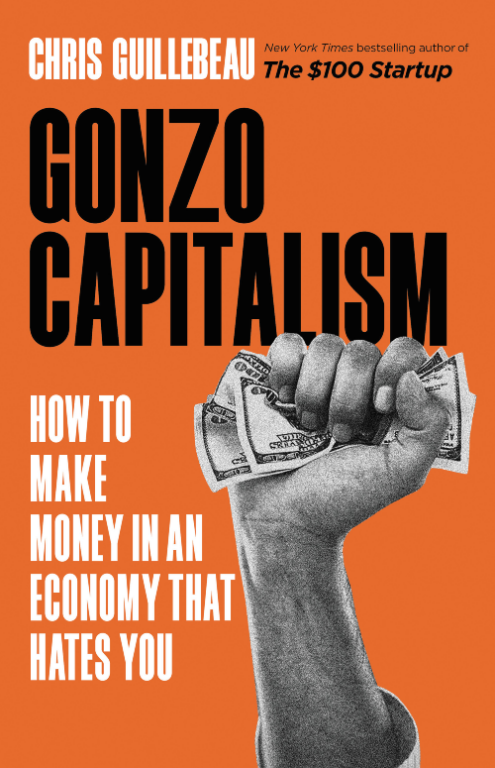Welcome to “Peak Marketplace”: An excerpt from Gonzo Capitalism
In his new book, Chris Guillebeau explores the strange post-pandemic economy, where it seems anything and everything is for sale.
Advertisement
In his new book, Chris Guillebeau explores the strange post-pandemic economy, where it seems anything and everything is for sale.

CONCEPT: The Money Revolution brought us to a stage in modern society in which everything is for sale. Every skill, talent, hobby, or source of knowledge can be monetized. Decentralized platforms allow you to go to market immediately, without banks or other gatekeepers.

There’s nothing like massive economic shock to spark a revolution. And the shock precipitated by the pandemic was accompanied by social upheaval just as consequential. Among the most jarring indicators that things were changing, perhaps permanently, was the realization that no matter how advanced our civilization had become, a nasty virus could still show up one day and shut down much of the world.
Whether you lost loved ones, got sick yourself, or somehow escaped the whole thing, chances are you did some reflecting during this period. Everyone did.
It was around this time that millions of people began to question their workplace loyalties. There are many theories about why the Great Resignation happened when it did, but to anyone who was paying attention, it sure seemed like most of these people were quitting simply because they were fed up.
Millions more staged a similar protest in the form of “quiet quitting,” a movement that encouraged employees to keep showing up to work and collecting their paychecks but stop working so hard for their employers. Going above and beyond was so last year. Even more radical was the antiwork subculture that thrived on Reddit. This philosophy borrowed from Marxism to claim that today’s model of work, and maybe even capitalism itself, was fundamentally flawed and in need of being dismantled.
All of these movements had two things in common. The first was broad skepticism and distrust of “the system.” Corporations and their greedy executives were exploiting workers. The government, regardless of who was in charge, was ineffective. Banks were out to pillage. Wall Street, hedge funds, the revolving door of government and private industry—they were all rigged in favour of elites.
This was the rare social movement that transcended politics. Whether they watched Rachel Maddow or listened to Joe Rogan, the consumers of punditry were mad.
Populism fuelled political campaigns, from Bernie Sanders to Donald Trump. Though they were ideological opposites, these elderly New Yorkers skillfully deployed an outsider, anti-establishment message to attract many of the same young and disaffected voters.
The second thing these movements had in common is where things get complicated. Many of the self-proclaimed anticapitalists were motivated by money!
Yet another meme, get the bag—that is, the bag of money—took hold. The antiworkers didn’t like the idea of their employers getting rich on the backs of their low-paid labour, but they weren’t philosophically opposed to the idea of acquiring large sums of money themselves. They were mad, sure, but that didn’t mean they wanted to live in poverty.
Podcasts were launched with millions of dollars in sponsorship. Instagram influencers hawked handbags and vape pens. More than a million people set up Shopify stores, selling anything you could imagine. At the end of the day, all those people pursuing the work-free life still had to pay their rent.
These realities coexisted, sometimes messily, always in flux.
When school was abruptly cancelled in the spring of 2020, social studies teacher Rebecca Rogers went home and began an all-new career.
As the lockdowns and the long hours of virtual teaching stretched on, she found herself increasingly in need of an outlet for burnout and stress. Plus, she liked to experiment. So on a whim, Rogers decided to make an account on TikTok and post videos “making a fool” of herself. A typical video shares a story of something funny or terrible (or both) that happened that day. She also answers questions in a series called Am I the bad apple?, a gentler version of Reddit’s Am I the asshole? forum. Rogers roleplays as multiple characters, frequently splitting between teacher and student perspective, sometimes throwing in an angry parent or power-tripping principal as well.
Her preteen and teenage students were worried that she’d get cancelled, but something else happened: She got famous.
And here’s where we can begin to see how hardship for some created opportunities for others.
On the heels of lockdowns came the global supply chain crisis. In Britain, a 22-year-old named Jake Slinn started a business buying unopened shipping containers that were backlogged in ports worldwide, then reselling their contents.
Each one he purchased was a grab bag of surprises, like you might see on Storage Wars, only these were massive containers holding goods from all over the world. One shipment might contain raw building materials, another one cheap, mass-produced electronics. Artwork, electric scooters, vehicles, French cheese—Jake saw (and resold) it all.
When one cargo door closes, a container ship opens. The disruption in shipping enabled Jake’s business to thrive.
Another disruption that spawned a whole new ecosystem of businesses was the transition to remote work. Companies that had previously resisted allowing their employees to work from home suddenly had no choice—and after some growing pains, the transition turned out to be easier than expected.
Seemingly anything could be moved online, from religious services to therapy to music lessons to a whole host of other activities that had seemed impossible in a remote setting just a few months before. The convenience and scale that this enabled quickly paved the way for all kinds of new business opportunities.
A friend of mine started a virtual mediation group, charging $20 a month. She soon had several thousand dollars in monthly billing and a waiting list. I heard from a dog trainer who offered lessons by Zoom. Legal hearings, doctors’ visits, speed dating, you name it… everything was remote, or at least it could be.
Welcome to the era of “peak marketplace,” where everything you can imagine (and many things you can’t) can be bought and sold in fast-moving virtual markets.
New networks and forms of payment emerged to serve this new landscape, where anyone selling virtual dog training sessions or the contents of shipping containers could bypass credit card transaction fees and accept payments directly.
Simultaneously, many regulations and controls went out the window, eliminating the barriers to entry for anyone with an internet connection and an idea. Financial products and models that were once available only to professional traders became widely accessible (for better or worse!).
Even governments realized they could get away with selling just about anything. For a nonrefundable contribution of $150,000, the island nation of Grenada offered citizenship for sale. Not to be outdone, its neighbour Dominica invited you into the family for merely $100,000.
In the U.S., Yellowstone National Park offered an annual pass for $1,500. Sounds like a good deal for a frequent visitor, but there was just one small catch. The pass (appropriately named the Inheritance Pass) wouldn’t be valid for another 150 years.
That’s right, should the planet still exist in 2172—and assuming the National Park Service is still running the show at Yellowstone—your descendants will be able to visit for free. What a deal!
At the same time, it became easier than ever to accumulate massive numbers of social media followers, monetizing them with ads and brand sponsorships. Countless microcommunities emerged, along with new ways to communicate and create that simply didn’t exist before.
Yes, people have been able to “build a social following” since the prehistoric days of MySpace. But not like now.
Rebecca Rogers, the teacher-turned-TikTok-star, amassed more than a million followers in a matter of months. Soon she was flooded with sponsor inquiries and was waking up every day to another 10,000 people tuning in. The direct payment she received for her viral videos paled in comparison to what she earned from partnerships—just like pro athletes with promo deals that vastly eclipse their large contracts to play a sport.
Compare this story to another one I told on my podcast a couple of years ago. In that earlier story, a hardworking teacher had dutifully compiled a collection of foreign-language curriculum aids that she sold online to other teachers, and she went on to make an extra $3,000 a month from her efforts—more than half of her salary from teaching. But in this new era, Rebecca Rogers could make much more than that from a single sponsored post. The difference was striking. Not only was her project far more lucrative, it operated on a different scale of engagement.
In this brave new world, everyone can be a creator, and the creators (sometimes called influencers, though they aren’t the same thing) have all the power. They aren’t afraid to use it, either. Collective action campaigns can redistribute wealth, bestow instant celebrity status, or simply wreak havoc on markets.
It’s an exciting, confusing, disorienting, and fascinating time to be alive.
Excerpted from Gonzo Capitalism: How to Make Money in an Economy That Hates You by Chris Guillebeau. (Copyright 2023 by Chris Guillebeau. Published with permission by Little, Brown Spark, an imprint of Little, Brown and Company.) The author’s previous books include The $100 Startup, Side Hustle, The Art of Non-Conformity and more, and he runs a popular daily podcast, “Side Hustle School.”
Read our My MoneySense Q&A with Chris Guillebeau.
Share this article Share on Facebook Share on Twitter Share on Linkedin Share on Reddit Share on Email